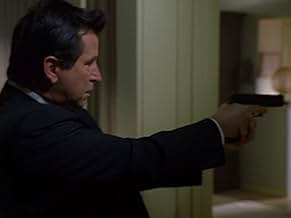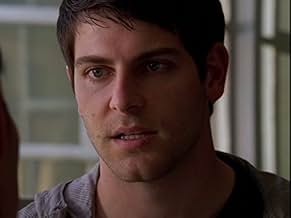I casi di un'unità dell'FBI specializzata nelle indagini sulle persone scomparse.I casi di un'unità dell'FBI specializzata nelle indagini sulle persone scomparse.I casi di un'unità dell'FBI specializzata nelle indagini sulle persone scomparse.
- Vincitore di 2 Primetime Emmy
- 21 vittorie e 47 candidature totali
Sfoglia gli episodi
Recensioni in evidenza
9kols
After reading a half-dozen of the reviews convinced that a lot of folks who didn't like it were expecting a typical cop show. It isn't. May have been an experiment on Bruckheimer's part - turning cop show conventions on their head.
First there's the shows low-key tone: no screaming sirens, no melodramatic hooks, no heart-pounding chases or rescues. Chases and especially rescues do exist but, like all of the other expositional elements, they're portrayed in measured, deliberate and muted tones. Just like the "teams" response to each week's puzzle. All very quiet with just a hint of intensity and a clear demonstration that they care about their victims.
All elements that, except for the tone, Without a Trace shares with most cop shows. Just reversed.
Now here's the really radical departure - the show's focus is centered on what are usually the secondary characters: the victims and the lives surrounding them. In fact, most of the "team's" interactions are with the secondary characters.
Think about shows, very good shows, like Bones or Castle or Burn Notice or any one of dozens of cop shows: all centered on the "team" and it interactions. Victims, perps and puzzles exist mainly to highlight those interactions.
This is not a criticism. I love the shows mentioned.
My point is simply that Without a Trace reverses those conventions and does it very successfully. One one hand, enough time is spent on the team to humanize it; on the other, just enough emphasis on the victims and their stories to elevate them to the the primary focus.
Takes some getting used to but well worth the effort. Surprising, those few scenes dedicated to the "team", either as individuals or a whole, wind up describing a very rich set of personalities, though you might have to watch a lot of episodes to realize it.
Like all cop shows there there are problems with plot integrity and, with Without a Trace, the very premise: the FBI getting involved before the local cops and their 48-hour window. And like all cop shows, the inconsistencies and questionable plot lines are simply elements meant to invoke the suspension of disbelief. Nothing more.
If this was an experiment on Bruckheimer's part, seven seasons speak volumes to its success.
First there's the shows low-key tone: no screaming sirens, no melodramatic hooks, no heart-pounding chases or rescues. Chases and especially rescues do exist but, like all of the other expositional elements, they're portrayed in measured, deliberate and muted tones. Just like the "teams" response to each week's puzzle. All very quiet with just a hint of intensity and a clear demonstration that they care about their victims.
All elements that, except for the tone, Without a Trace shares with most cop shows. Just reversed.
Now here's the really radical departure - the show's focus is centered on what are usually the secondary characters: the victims and the lives surrounding them. In fact, most of the "team's" interactions are with the secondary characters.
Think about shows, very good shows, like Bones or Castle or Burn Notice or any one of dozens of cop shows: all centered on the "team" and it interactions. Victims, perps and puzzles exist mainly to highlight those interactions.
This is not a criticism. I love the shows mentioned.
My point is simply that Without a Trace reverses those conventions and does it very successfully. One one hand, enough time is spent on the team to humanize it; on the other, just enough emphasis on the victims and their stories to elevate them to the the primary focus.
Takes some getting used to but well worth the effort. Surprising, those few scenes dedicated to the "team", either as individuals or a whole, wind up describing a very rich set of personalities, though you might have to watch a lot of episodes to realize it.
Like all cop shows there there are problems with plot integrity and, with Without a Trace, the very premise: the FBI getting involved before the local cops and their 48-hour window. And like all cop shows, the inconsistencies and questionable plot lines are simply elements meant to invoke the suspension of disbelief. Nothing more.
If this was an experiment on Bruckheimer's part, seven seasons speak volumes to its success.
I always enjoy a good mystery and this is definitely one of those.....They are not afraid to tackle social issues like Abortion and Middle Eastern politics and much more.....Definitely a great series and I wish it had lasted even longer...but it did have a long run..........
The show is still very good though my friends and I, who watch it together, agree with another viewer that Ms Sanchez ruined an excellent #10 show. There were already two women and a Spanish-American on board, so the show was politically correct and the ensemble fantastic. I never wished anybody (besides Hitler and heads of the soviet Union) to die, but I heartily wish that Ms Sanches' character would be shot for good and the show would return to its previous magnificence. Well, then I could purchase the following seasons' disks as well as those I had without Ms Sanchez' not enjoyable and unwanted presence. Could there be a possible hope in that direction? What a great thing it would be.
I am sorry that "Without A Trace" went off the air after five years, though I agree with other reviewers that it had probably exhausted its possibilities. The show had many things going for it: a first-rate cast, a set of often surprising plot twists, and an ability to look at some of the darkest parts of New York city life. Anthony LaPaglia, as the head of the FBI missing- persons unit, gave a set of performances that were truly gripping: his character was always tough, devoted, and often very reserved, but there was always an enormous amount of passion locked within him which would come out at the most desperate moments. The rest of the cast were uniformly good, and I agree with many other observers that Marianne Jean-Baptiste was a superb actress and a perfect colleague for LaPaglia's plain-spoken FBI man.
It is true, though, that as the years went by, the script writers appear to have run out of ideas about missing/abducted/brutalized persons and turned more and more to examining the personal lives of the FBI agents. We had love affairs between LaPaglia and Montgomery, Close and Montgomery, and Murciano and Sanchez, not to mention the collapse of LaPaglia's character's marriage, and the show did become more and more of a soap opera. It was probably at that point that the show started to lose the interest of its viewers.
But the single most important relationship in the show -- not a romantic relationship so much as a deeply personal relationship between two characters who really respected each other, even when they fought with each other -- was the relationship between LaPaglia's character and Jean-Baptiste's character. They were the stars of the show, and the way they agreed but often disagreed about their jobs and their lives made the show the wonderful, poignant success that it was for so many years.
It is true, though, that as the years went by, the script writers appear to have run out of ideas about missing/abducted/brutalized persons and turned more and more to examining the personal lives of the FBI agents. We had love affairs between LaPaglia and Montgomery, Close and Montgomery, and Murciano and Sanchez, not to mention the collapse of LaPaglia's character's marriage, and the show did become more and more of a soap opera. It was probably at that point that the show started to lose the interest of its viewers.
But the single most important relationship in the show -- not a romantic relationship so much as a deeply personal relationship between two characters who really respected each other, even when they fought with each other -- was the relationship between LaPaglia's character and Jean-Baptiste's character. They were the stars of the show, and the way they agreed but often disagreed about their jobs and their lives made the show the wonderful, poignant success that it was for so many years.
WAT is the show I look forward to watching most every week (comes in a close 2nd after The Closer). I don't know why so many people think the show has gone downhill. It still holds my interest for that hour. My only criticism (and it's not about Rosalyn Sanchez) is that they have one of the most talented actresses alive today, Marianne Jean-Baptiste, and they hardly use her! She deserves much more character development and depth to her role. It's the same story with S. Epatha Merkerson on Law & Order. Another underused great talent. However, perhaps after being recognized for Lackawanna Blues, NBC will wake up. Let's see more Marianne in the future. At least let her express an emotion every now and then. Even Tony LaPaglia is allowed to do that.
Lo sapevi?
- QuizDuring each episode, a 15-second presentation appears, asking the public for help in finding real-life missing persons. The FBI provides a picture and descriptive information about the missing person to be displayed with a voice-over message recorded by one of the series stars.
- BlooperSince the inception of the agency, FBI agents travel in pairs when interview subjects. This is both to have a witness to the interview as well as for protection in case unexpected things occur. Multiple times during the show, single agents are shown talking with subjects alone, even in their homes or places unfamiliar to the agents.
- Citazioni
Martin: I think he's sleeping with her. The way he talks about her and she's climbing that corporate ladder pretty quick.
Jack Malone: He may be in love with her, but he's not sleeping with her. Never even thought about it.
[Martin looks quizzically at Jack]
Jack Malone: He's gay.
Martin: What, because he called her a "fireball"?
Jack Malone: No... 'cause he was checking you out.
- Curiosità sui creditiAmongst the opening credits, for a brief moment the words "Amber Alert" are flashed on the screen. The Amber Alert system was formally inaugurated in the state of California, July 31, 2002. It drew both national and international recognition in its success in aiding authorities in their search for abducted children. In less than one year, the California Amber Alert system has been credited with aiding in the rescue of over a dozen children. The intial system was formulated in Texas in 1996, and is named after 9-year-old Amber Hagerman who was kidnapped and murdered. As of April 10, 2003 a bill creating a national Amber Alert system has passed in the House of Representitives, and unanimously approved in the Senate. "Without A Trace" (2002) aired its first episode shortly after a summer littered with nationally covered child kidnappings including the famous Elizabeth Smart abduction. The show aired Elizabeth's profile following its November 21, 2002 episode, In Extrimis. All Profiles are chosen by the FBI, not the show's producers.
- ConnessioniFeatured in The 55th Annual Primetime Emmy Awards (2003)
- Colonne sonoreOne (Is The Loneliest Number)
Performed by The Tao of Groove
I più visti
Accedi per valutare e creare un elenco di titoli salvati per ottenere consigli personalizzati
- How many seasons does Without a Trace have?Powered by Alexa
- How did it end?
Dettagli
- Data di uscita
- Paese di origine
- Sito ufficiale
- Lingua
- Celebre anche come
- Without a Trace
- Luoghi delle riprese
- Aziende produttrici
- Vedi altri crediti dell’azienda su IMDbPro
Contribuisci a questa pagina
Suggerisci una modifica o aggiungi i contenuti mancanti

Divario superiore
By what name was Senza traccia (2002) officially released in India in Hindi?
Rispondi


































